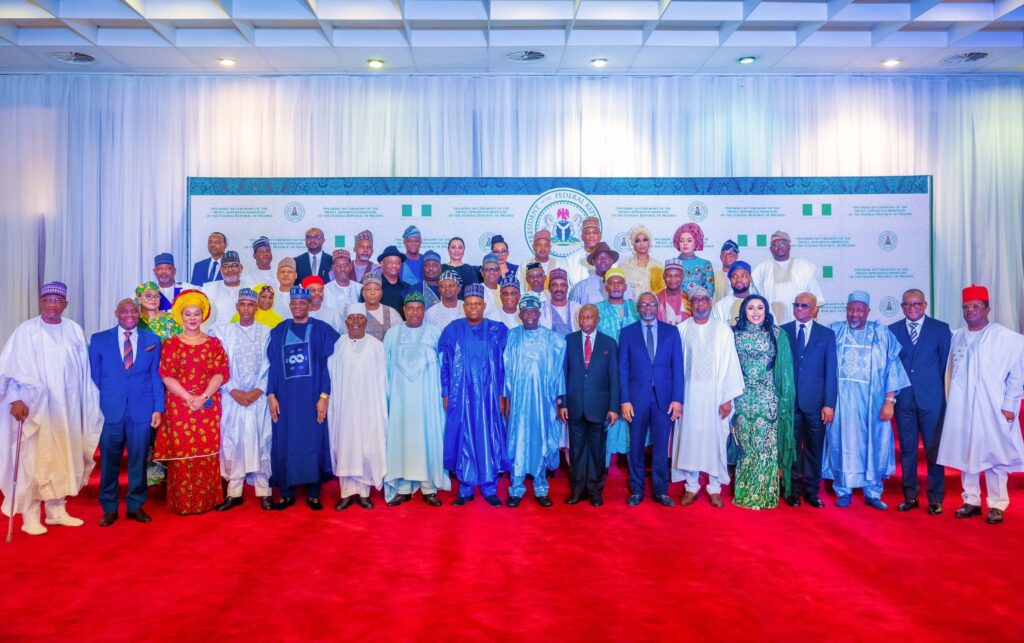By Blossom Chukwu
The scorecard of the Nigerian political system has not been too high when compared to that of nations like America, Britain etc. An average Nigerian is seen to be either pessimistic or indifferent towards governance and the Government. These set of attitudes and political culture, which are prejudicial to nation-building and national development, have also affected the way and manner national service is rendered, in different tiers of Government.
It is an established fact that a political system thrives on its political culture, through which policies are made and implemented. It has been observed that in Nigeria, more attention is often paid to the formal structure, than the informal structure, which comprises the people’s political culture.
In this context, Political Culture, is referring to a set of shared beliefs, values, norms and ideals, which influences the opinions, feelings and attitudes of a people towards their Government. Bearing this in mind, the notion that every person has a role to play in national development and growth, cannot be overstated. This idea is the core principle of active citizenship, which has received spotlight attention in the last few decades.
Active Citizenship also entails any form of active participation in a community’s public life, in an informed, committed, and constructive manner, focusing on the common good of the people. With this mindset, heads of Ministries, Departments and Agencies across the country, are expected to render true national service for the common good of all.
Remarkably, there is a link between Transformative Leadership and Civic Responsibility. While the former stresses the need to act in ways that contribute to social good, the latter focuses on active participation in an informed and coordinated manner. Therefore, as much as Leaders and Heads of Ministries are expected to serve beyond personal gains, for the common good of all, Citizens also need to become more conscious of their actions in contributing positively to community development.
According to the OECD, The Organisation for Economic Co-operation and Development, which is an international organisation that works to build better policies for better lives, “Assigning clear responsibilities to the actors in the integrity system, is necessary to ensure co-operation, avoid overlaps and prevent fragmentation in Government. Responsibilities include developing, implementing, monitoring and evaluating integrity standards and tools, and are carried out by actors across the whole of Government, which includes (Legislative, Executive and Judiciary)”.
This is why for the newly appointed Ministers, Heads of Departments and Agencies, all public officials at all levels of Government are expected to carry out their duties wholly, in the public interest.
To prevent fragmentation and overlap in the public integrity system, the OECD recommends that adherents should clarify institutional responsibilities across the public sector, to strengthen the effectiveness of the public integrity system, in particular through:
1. Ensuring that all public officials, units or bodies (including autonomous and/or independent ones), with a central responsibility for the development, implementation, enforcement and/or monitoring of elements of the public system within their jurisdiction, have the appropriate mandate and capacity to fulfil their responsibilities.
2. Promoting mechanisms for horizontal and vertical co-operation between such public officials, units or bodies where possible, through formal or informal means to support coherence, avoid overlaps and to share and build on lessons learned from good practices.
It is interesting to note that Nigeria is at an exciting juncture in history, partly due to its increasing young population. A unique challenge emerges in this regard, with the effective management of this youthful population across all Ministries, Departments and Agencies, in all tiers of Government. Imagine a Nigeria where every Youth takes responsibility and promotes social good through disciplined action, affected by good leadership that can be emulated. The results will definitely be unprecedented.
One of the major reasons why this has not been experienced yet, is the challenge of good democratic governance in Nigeria, therefore, getting selfless, visionary, patriotic, pro-people, inclusive, focused and effective leaders, to drive/pilot Nigeria’s national affairs and the political economy towards good, democratic governance. In the current situation, getting things right and reverting to the appropriate trajectory of good democratic governance would require selfless, visionary leadership committed to, and focused on, people-oriented policies for socio-economic growth and development.
For Nigeria’s progress and development, with the Tinubu administration fully in progress with political appointees, Nigeria requires people in leadership positions, who are not merely selfless, but also visionary, patriotic and people-oriented. These are Heads of Government who have the capacity, competence and ability to appreciate and manage the complexity of Nigeria’s diversity, on the basis of equity, equality of opportunity, fair-play and the rule of law. This connotes that it is not too late to make changes, for leaders who were only out for personal gains.
This explains why Nigerians are looking forward to experiencing more of Leaders who can protect, defend and advance citizenship rights against discrimination, marginalisation, predation and exclusion. This is as Selfless Leadership is desirable for societal progress and development, as it is focused on satisfying collective needs and aspirations, in contrast to leadership characterised by selfishness, which is pre-occupied with personal gains.
For Selfless Leadership, Nigerians also look forward to experiencing among other things, the following: Good character, ethical conduct and moral uprightness, capacity and ability to facilitate the happiness, success and aspirations of citizens at enormous personal sacrifices, show of concern more with the needs of others than personal selfish ones, thinking and acting more of others beyond self, sacrificing time, comfort and effort in the service of others, humility to listen to, understand and treat others with dignity and respect, disposition to be responsible and responsive to the expectations, needs and aspirations of the citizens, commitment to give one’s best with courage of conviction, among other excellent factors.
Selfless Leaders are the epitome of service to the people, deserving of the recognition and title of “Servant-leaders”. They devote themselves to effective and efficient service delivery to the citizens, driving satisfaction from positive outcomes and value-addition. In otherwords, collective action is a sum of individual action done towards a common cause; therefore, making it imperative for everyone to contribute their quota.
An evaluation of LEAP Africa’s Virtual Youth Leadership Programme reveals that in 2020, over 73% of Youths said the Community change project they engaged in, apart from tackling social problems in their communities, participants experienced the joy of engaging their agencies and contributing to social good.
To this end, the Youth Day of Service (YDOS), an initiative instituted by LEAP Africa, offers a great insight into how impactful Communal volunteering can be for Communities. The Youth Day of Service is an annual event to empower young people to become change agents, strengthen communities and encourage collective action to actualise SGDs in 2030.
If in 2020, about 1,271 youth volunteers from 28 states in Nigeria, participated in various forms of community service, engaging in about 81 projects; the impact which was astounding as indirect beneficiaries were about 11,500 across different communities, how much more Leaders and Heads of Government who can initiate more positive change, with the increased influence they have. If people’s lives were positively affected due to the actions of responsible youths, it indicates how individual action builds into collective action in Government, when galvanising for social good and community change.
In line with this increased demand for positive change by Government Heads, a retired professor of sociology at the University of Lagos, Lai Olurode, earlier advised President Asiwaju Bola Tinubu, to place service as a priority rather than just political appointments. Olurode in a statement he issued in Lagos recently, asked Tinubu and newly elected Governors to consider certain critical factors in nominating those to serve in their Governments.
Among the factors he enumerated, he emphasised on readiness to serve as a central key factor. He concluded by advising Nigerians to emulate the attitudes of late Alhaji Lateef Jakande, Chief Bisi Akande among few others, whose attitude to governance was one of service which can be achieved even outside of political office.
The fact remains that in Nigeria, both individual and collective participation for nation-building is key. As Leaders and Citizens, everyone has a role to play, and one person’s negligence has a ripple effect on others. Why we look forward to sterling acts of leadership as has never been experienced in Government, we should also see every day as an opportunity to contribute in little ways, to nation building and various acts of societal service.
This implies that more than ever before, leadership responsibilities which includes political action, advocacy, non-partisan activities, obeying state’s laws among others, must continuously engage all Heads of Ministries, Departments and Agencies, towards common social good. Understandably, though the Government has clear roles in terms of governance and providing strategic development plans, citizens should also take responsibility for protecting public properties, obeying statutory laws, engaging in volunteering activities, for the general pursuance of a better society, for all.








More Stories
Senate Drama: Akpabio vs. Natasha and the Lessons for Nigeria
What if Farotimi’s allegations are not false
Governor Otti unveils new era of development for Ohafia with landmark bill signing